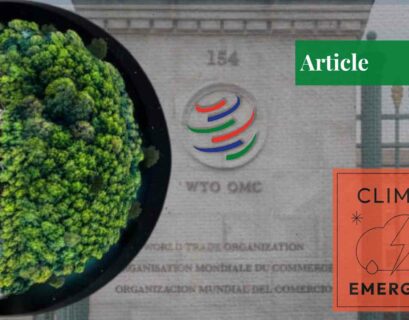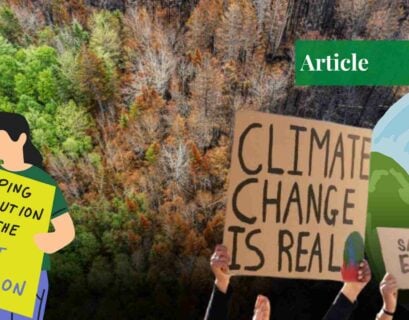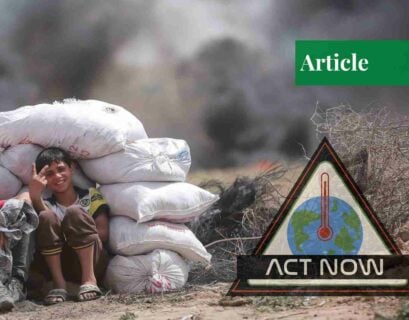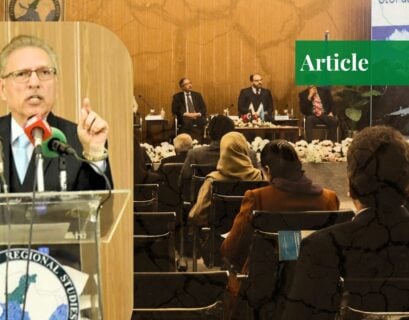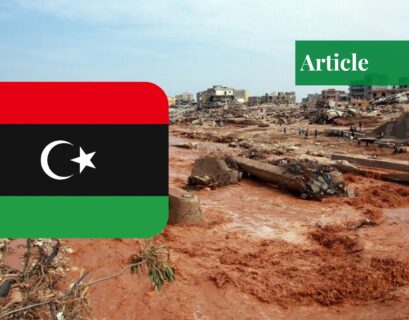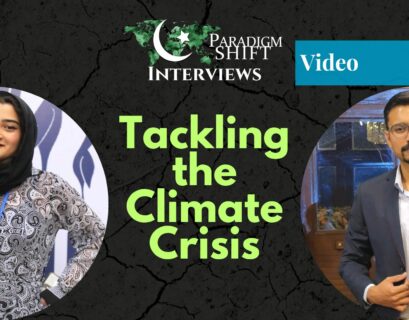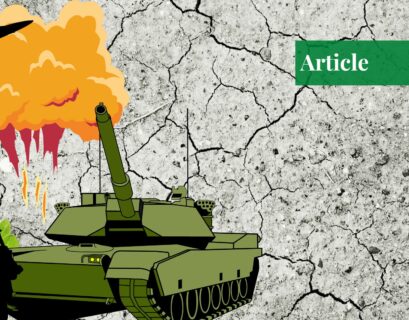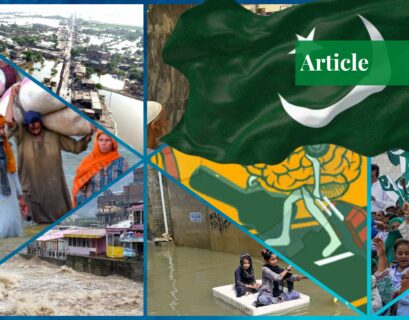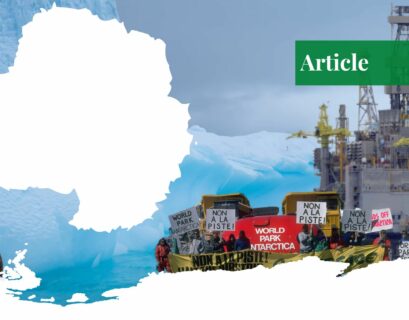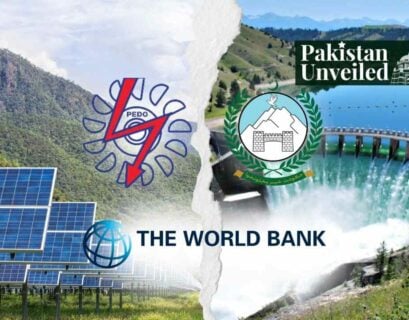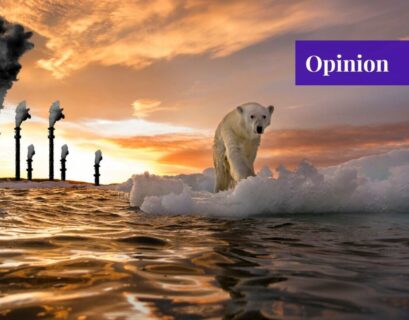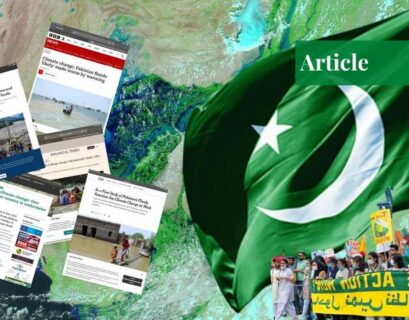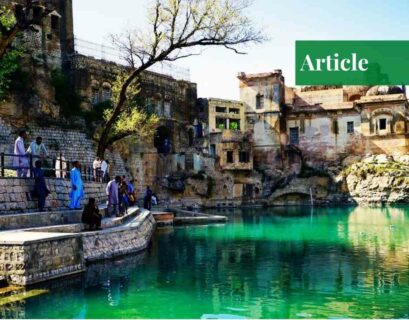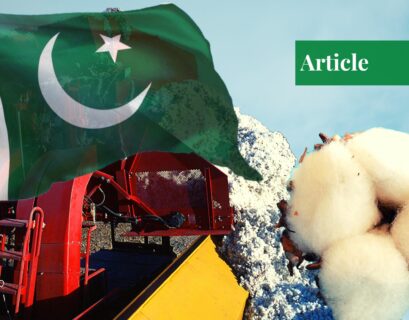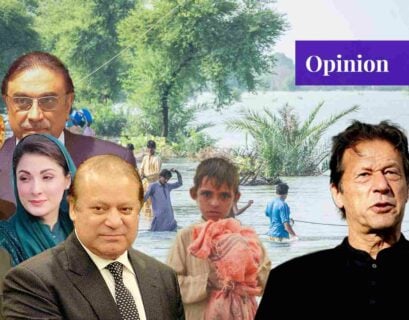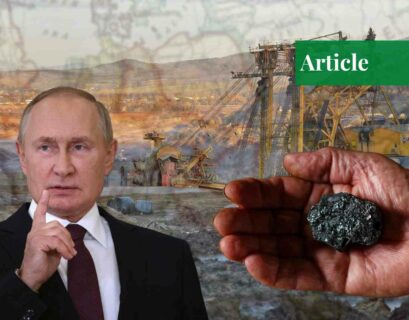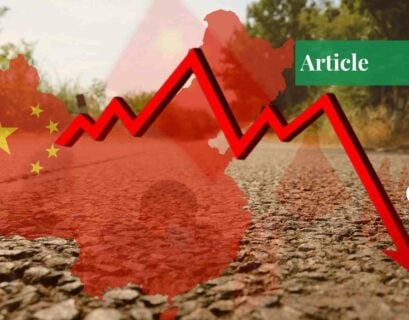Global Governance Over Climate Change: Case Study of the World Trade Organization (WTO)
Several factors hamper global governance over climate change, such as the overwhelming North-South divide, institutional stagnancy, and rampant capitalism.
Shiza Ahmed built upon the case study of the World Trade Organization (WTO) and detailed how it could play an impactful role in alleviating the effects of the climate crisis.
What kind of reforms would the WTO have to undergo to help curb the effects of climate change?
Global Institutions and International Agreements on Climate Change
The issue of climate change is caused by anthropogenic greenhouse gas emissions from activities such as the use of fossil fuels and agriculture, and natural sources such as forest fires and volcanoes.
Shiza Ahmed notes an urgent need for global consensus and collective efforts to mitigate and adapt to the issue.
The Israeli War in Gaza: Where Climate Change Meets Conflict
The highly anticipated COP28, held in Dubai in December 2023, took place amidst the ongoing war between Israel and Palestine. The authors examine the conference’s agenda and achievements through the lens of the conflict-climate intersection.
They discuss how these two concepts are deeply interconnected and highlight that the COP’s exclusion of the conflict, primarily the Israel-Gaza war, from the agenda makes it challenging to achieve climate goals in the region.
Regional Dialogue 2024: Advocating Sustainable Agriculture and Climate Resilience
At the Regional Dialogue 2024, hosted by the Institute of Regional Studies (IRS), President Arif Alvi emphasized the imperative role of modern agricultural technology in tackling the climate crisis.
Proposing upgrades to Pakistan’s agriculture sector, he advocated for sophisticated irrigation methods and adherence to international standards and guidelines.
During the three-day dialogue, DG (ISSI) Ambassador Sohail Mahmood, former foreign minister, Inam Ul Haque, the current foreign minister, Jalil Abbas Jilani, and Aisha Khan of the Civil Society Coalition for Climate Change also addressed the issue.
Understanding the Devastating Impact of the 2023 Floods in Libya
In September 2023, Libya faced a catastrophe of unparalleled proportions as it was ravaged by devastating floods. The effects of these floods were far-reaching, leaving behind a trail of destruction and human suffering. As the waters swept through cities and villages, homes were destroyed, infrastructure was decimated, and lives were upended. In the aftermath of the floods, Hafsa Ammar sheds light on the extent of the damage caused and the challenges faced by the affected communities. From the loss of lives and displacement of people to the disruption of essential services like healthcare and clean water supply, the impact of these floods cannot be overstated.
[Video] Can Pakistan Tackle the Climate Crisis?
In our exclusive interview with Hania Imran, the visionary behind “Youth Climate Activists Pakistan,” we delve into Pakistan’s distinctive standing as one of the world’s most vulnerable nations to the climate crisis, and deliberate the critical actions required to address this pressing issue.
Intersecting Challenges: Arms Control and Climate Change
Wajeeha Amin explores the undeniable link between militarism and climate change. She asserts that military operations have substantial environmental impacts, including energy consumption, hazardous waste production, and habitat destruction. Nuclear weapons themselves pose devastating threats to the environment, from immediate devastation to long-term radioactive fallout. Hence, balancing defense budgets with climate solutions, and disarmament are essential to reducing climate change’s impacts.
Climate Change: A Growing Challenge to State Sovereignty
The sovereignty of states cannot be studied in isolation from the environment in which they reside. Changes in climate patterns have a profound impact on human behavior and pose new challenges for the state. As rising sea levels, droughts, erratic rainfall, and food insecurity sweep across regions due to climate change, large populations have begun abandoning their homelands in search of security and better living standards. Athar Ali discusses how climate-driven mass migrations have influenced the sovereignty of states, disrupting socio-economic and political development.
The Arctic Region: A New Frontier for Geostrategic Competition
The Arctic region is witnessing a surge in geostrategic competition. It has attracted the attention of several key players, each with their own interests and motivations. Russia, for example, sees the Arctic as a strategic area for resource extraction and military dominance. Meanwhile, the United States is concerned about maintaining its influence in the region in the midst of China’s increasing economic and strategic involvement. The competing interests of these nations are shaping the geostrategic competition in the Arctic and have the potential to impact global dynamics.
PEDO to Market Its Carbon Credits Via World Bank
The KP government’s Pakhtunkhwa Energy Development Organization (PEDO) has been producing clean energy for three decades now.
In view of that, the organization could bring in 60 million USD annually if it were to market its carbon credits through the World Bank.
Reassuring Recommendations for Our Climate Woes
Despite conferences such as the COP and Davos meetings being held annually, world temperatures are only seen to be soaring, and their impact is drastically witnessed by people all across the globe.
This then begs the question, “What can be done to improve efforts in mitigating major climate-related calamities?”
In this piece, Myra Imran Rafiq provides several circular and sustainable recommendations for tackling climate change.
Buzzwords in the National Climate Change Policy of Pakistan
Seemal Nadeem examines the climate change policies of Pakistan (2012 and 2021) to identify how terms like ‘sustainable’, ‘mitigation’, and ‘adaptation’ have been used.
She also explains how these terms became a part of the development theory, and the implications these terms have for Pakistan and its policies.
Pakistani Exports: The Struggling Cotton & Textile Industries
Despite being the 4th largest producer of cotton in Asia, Pakistan ranks 8th in the continent when it comes to its textile exports. Although Pakistan’s textile exports have increased in the last year, its textile industry has not been functioning up to its true potential. Noticing this, Muhammad Bilal Farooq identifies the multiple factors that have fettered the growth of Pakistan’s textile exports over the years. He suggests that Pakistan’s government and private sector take immediate actions to address these impediments.
Political Polarization in Pakistan and the 2022 Floods
In their attempts to undermine their opponents, Pakistan’s political elite have polarized the citizens of the state. Hamra Tariq notes that this political polarization has prevented the state of Pakistan from reaching an agreement on matters of national security. She takes the case of the 2022 floodings in Pakistan to demonstrate the impact of this divide on the effective management of the crisis, and on the formulation of a climate policy.
Europe and Coal: The Energy Crisis Forcing EU to Revert to Fossil Fuels
In light of the recent import ban on Russia, European countries are facing a severe energy crisis. As the fuel hike persists, it is becoming increasingly impossible to maintain efficiency while being environmentally conscious.
Due to this, many countries have reverted back to extracting the primary source of their energy from coal.
While Abrish Nayyar highlights the need to revert to fossil fuels, she also discusses the environmental devastation that such usage will cause.
Will China’s Deadening Heatwaves Bring Its GDP Down?
China’s recent blistering experience with heatwaves has made it difficult for the country to resolve the energy crisis. The demand for power has escalated to unprecedented heights mainly due to the unrelenting heatwaves.
Alina Minhas and Amna Asif believe that this heatwave may negatively impact crop yields and hydroelectricity generation, thus damaging the country’s GDP.
